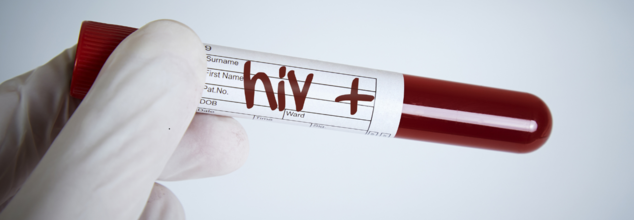- Health Conditions A-Z
- Health & Wellness
- Nutrition
- Fitness
- Health News
- Ayurveda
- Videos
- Medicine A-Z
- Parenting
- Web Stories
Fact Check: Can HIV Spread Through Saliva?

Credits: Canva
Human immunodeficiency virus or HIV continues to remain a major global public health issue, and has claimed an estimated of 42.3 million lives to this date, notes the World Health Organization (WHO). Despite its prevalence, there are many myths associated with the condition. While it is a fact that HIV is spread from body fluids of an infected person, including blood, breast milk, semen and vaginal fluids, it is not spread through saliva.
Why Can't You Spread HIV With Saliva?
As per the 1999 study published in Archives of Internal Medicine, titled Why is HIV rarely transmitted by oral secretions? Saliva can disrupt orally shed, infected leukocytes, notes that oral transmission of HIV by the millions of HIV-infected individuals are a rare event.
Another 2006 review, published in journal Oral Diseases, titled Oral Transmission of HIV, reality or fiction? An update, notes that HIV and many other viruses can be isolated in blood and body fluids, including saliva, and can be transmitted by genital-genital and especially anal-genital sexual activity. The risk of transmission of HIV via oral sexual practices is very low. Unlike other mucosal areas of the body, the oral cavity appears to be an extremely uncommon transmission route for HIV.
Why Saliva Is Not An HIV Carrier?
Saliva contains several proteins and enzymes that serve various functions, including beginning the digestion process, assisting in mouth lubrication and fighting off germs.
Secretory leukocyte protease inhibitor (SLPI) is an enzyme found in saliva, mucus, and seminal fluid. It helps protect the immune system by preventing HIV from infecting monocytes and T cells, two types of white blood cells.
Saliva thus also contain higher levels of SLPI than vaginal and rectal fluids. This could be the reason why HIV does not spread while kissing.
As per the Centers for Disease Control and Prevention (CDC), a person cannot transmit HIV through saliva or closed-mouth kissing. However, CDC also notes that in extremely rare cases, a person can transmit HIV through “deep, open-mouth kissing if both partners have sores or bleeding gums and blood from the HIV-positive partner gets into the bloodstream of the HIV-negative partner.”
Other bodily fluids that do not transmit HIV include sweat and tears.
Examples of What Won't Spread HIV?
- Kissing
- Sharing food or drinks
- Using the same bathrooms
- Touching and shaking hands
So, How Does HIV Spread?
HIV is transmitted through certain body fluids, particularly when they come into contact with mucous membranes, broken skin, or are directly injected into the bloodstream. Here’s how it can spread:
- Unprotected sex – HIV can be passed through vaginal, anal, or oral sex without the use of protection.
- Blood transfusions – Though rare today due to rigorous screening, it remains a possible route.
- Sharing needles – People who use injectable drugs face a high risk if they share needles or syringes.
- Mother-to-child transmission – The virus can be transmitted during childbirth or through breastfeeding.
Certain behaviors and situations can raise the risk of HIV transmission. Being aware of them can help you take effective preventive steps:
- Unprotected sex – Not using condoms during sexual activity increases the risk.
- Sharing needles – Using or sharing contaminated needles can transmit the virus.
- Multiple sexual partners – Having several partners can heighten exposure to HIV.
- Being born to an HIV-positive mother – The virus can be passed from mother to child during pregnancy, birth, or breastfeeding.
Kai Trump’s New Instagram Post Sparks Questions About Donald Trump’s Health And His Mysterious Hand Bruise

Credits: Instagram and Reuters
The US President Donald Trump's health has been a heated topic of debate ever since he has returned to the White House. The most speculated topic on his health comes from the dark bruise on his right hand. Now, a series of images, which is posted by his granddaughter has now revealed how long the President has had the discoloration on his hand.
These photos have now sparked a new set of questions on Trump's health, especially after Trump has be declared fit during his recent medical checkup.
Also Read: What Does Trump's Latest Health Checkup Reveal About Him?
What Did Kai Trump's Photo Reveal About Trump's Health?
His 18-year-old eldest granddaughter took to Instagram on Wednesday and posted a series of pictures to commemorate the anniversary of her YouTube journey. She wrote: "One year ago, I started my YouTube channel not knowing what to expect...and it is turned into something so special."
However, in one of the images, Kai is seen with Trump and the president had a thick layer of makeup on his hand that would cover the bruise. The image was taken on the day of the results at the watch party hosted by Trump at Mar-a-Lago. This proves that the President had this bruise that he covered with makeup much before he even took over the office.
This discovery made people believe that the White House is deliberately trying to hide the president's health issues for months, especially under the guise of his semi-annual health check that declared him fit.
When Was The First Time Trump's Bruise Was Noticed?
The bruise first came under public's eye soon after Trump was elected and he himself said in a TIME Magazine interview in December 2024, that this has happened due to frequently shaking hands with thousands of people.
Seconding the same, in 2025, the White House also used the same explanation, where his doctor Dr Sean Barbabella said that these bruises were "minor soft tissue irritation". The doctor also said that his has happened due to frequent handshaking by him and his use of aspirin as part of his normal heart health routine. The side effect of this, with his hand bruising like this was said to be a 'benign and well known" side effect.
In a memo published by White House, his physician noted: "consistent with minor soft tissue irritation from frequent handshaking and the use of aspirin, which is taken as part of a standard cardiovascular prevention regimen".
The medical report also noted that Trump's swollen ankles were caused by chronic venous insufficiency. This is a condition where veins find it difficult to send blood back to heart. The White House Press Secretary Karoline Leavitt told the media that Trump was still "in exceptional health", while backing the physician's comment on his health.
Recent Update On Trump's Health
Previously, Health And Me reported on an exclusive published on tabloid Radar, on October 16, that claimed that Trump is 'riddled with arthritis', and that he may need a double hip replacement surgery.
Read: Is US President Donald Trump Getting A Double Hip Replacement Surgery?
The tabloid’s report paints a sensational picture of severe arthritis and an alleged plan for double hip replacement, citing unnamed “sources” and hinting at possible cognitive issues. The story has since been picked up by several aggregator sites, spreading widely despite the absence of verified evidence. However, the publication provided no medical records, surgeon's statements, or official documents to support the claim.
However, as per the physical examination by the Walter Reed National Medical Center, President had no orthopedic surgery listed in his history.
Got Covid And Feeling Worse? These 3 Symptoms Could Be A Major Warning

Credits: Canva
Health officials are urging people to seek immediate medical help if they notice three particular symptoms appearing alongside Covid, as these could signal a more serious infection.
According to the latest data from the UK Health Security Agency (UKHSA), Covid cases have dipped slightly but remain present at “low levels” across the country. Hospital admissions have also fallen modestly, with weekly test positivity dropping to 10.3 percent from 11.9 percent the week before.
Despite the decline, people aged 85 and older continue to face the greatest risk of being hospitalised with the virus. Experts stress that identifying certain warning symptoms early can be key to preventing complications and ensuring timely treatment.
3 Covid Symptoms That Are Major Warning
People are being urged to seek urgent medical advice if they or their child develop three specific symptoms while infected with Covid, as it may point to a more serious illness.
Health experts recommend contacting a GP or calling for medical assistance if symptoms such as a rash, loss of appetite, or unusual weakness appear. Immediate help is also advised if a high temperature of 38°C or above lasts for five days or fails to reduce with paracetamol.
Medical attention is further encouraged if symptoms worsen, show no improvement, or if you are unsure how to manage them. For infants, extra caution is necessary as any baby under three months old with a temperature of 38°C or higher, or a child aged three to six months with a temperature above 39°C, should be assessed by a healthcare professional.
Covid Booster Shots: Who Can Get Them This Autumn
The eligibility rules for Covid booster vaccines have been updated for the current autumn rollout. While earlier boosters were offered to people aged 65 and above and those with certain long-term conditions, this year’s criteria have been made more specific.
Those eligible for the latest booster include:
- Adults aged 75 and over, including anyone who will turn 75 by January 31, 2026
- Individuals aged six months to 74 years with a weakened immune system due to illness or medical treatment
- Residents of care homes for older adults
- Health officials continue to encourage eligible groups to stay up to date with vaccinations, especially heading into the winter season, when respiratory infections tend to rise.
COVID-19 Variant Stratus: What You Should Know
A new COVID-19 strain known as Stratus, officially labeled XFG, has begun to circulate globally. First identified in Southeast Asia in January 2025, the variant quickly spread across 38 countries by mid-year. The World Health Organization (WHO) has classified Stratus as a “variant under monitoring,” meaning it is being closely studied to understand its transmission rate, symptom pattern, and potential health impact.
Frankenstein Variant: Common Symptoms of Stratus
For most people, especially those who are vaccinated or boosted, Stratus infections appear to be mild to moderate. Still, recognising its symptoms early remains important.
The most common signs include:
- Persistent dry cough
- Tiredness or fatigue
- Fever
- Other possible symptoms:
- Shortness of breath or chest tightness
- Sore or scratchy throat
- Headache and body aches
- Upset stomach, nausea, or loss of appetite
- Loss of taste or smell (now less frequent)
- Brain fog or difficulty concentrating
Atorvastatin Recall 2025: Safe Alternatives For Keeping Cholesterol In Check

Credits: CANVA
Atorvastatin Recall 2025: Statins have long been the first-line treatment for high cholesterol, but the Food and Drug Administration (FDA) has confirmed a nationwide recall of over 140,000 bottles of a cholesterol-lowering medication. Officials flagged that some pills may not dissolve properly after ingestion, potentially reducing effectiveness for patients who rely on them daily.
The recall affects Atorvastatin Calcium, the generic version of Lipitor, which is taken by roughly 39 million Americans, most of them adults over 40, according to Dr. Tamanna Singh of the Cleveland Clinic. Federal records show that the recalled batches were manufactured by Alkem Laboratories and distributed by Ascend Laboratories in New Jersey. The FDA’s September 19 enforcement report found that several batches failed quality tests designed to ensure proper dissolution of the pills.
If the pills dissolve inconsistently or more slowly than intended, the medication may not deliver the expected cholesterol-lowering effect. The FDA classified the recall as a Class II action, indicating moderate concern. While temporary or reversible side effects could occur, the likelihood of serious harm is low.
Atorvastatin Recall: Which Atorvastatin Tablets Are Affected
The recall covers multiple strengths and bottle sizes of Atorvastatin Calcium Tablets, which are among the most commonly prescribed statins globally. Affected formulations include:
- 10 mg – 90, 500, and 1,000 tablets per bottle
- 20 mg – 90, 500, and 1,000 tablets per bottle
- 40 mg – 90, 500, and 1,000 tablets per bottle
- 80 mg – 90 and 500 tablets per bottle
Cholesterol Medication Recalled: Safe Alternatives to Atorvastatin
If you are affected by the recall, there are several alternatives to help manage cholesterol levels effectively:
1. Ezetimibe (Zetia)
Ezetimibe is often recommended when a statin alone doesn’t sufficiently lower cholesterol. It may be used if you are on the maximum statin dose but your cholesterol remains high, or alongside statins such as atorvastatin or simvastatin for conditions like homozygous familial hypercholesterolemia.
Ezetimibe works by blocking cholesterol absorption in the small intestine, causing the body to use up more cholesterol from the blood. It is one of the few non-statin medications that can further reduce LDL cholesterol, either alone or combined with statins or other alternatives.
2. Fibrates (e.g., gemfibrozil, fenofibrate)
Fibrates mainly target high triglyceride levels, a type of fat in the blood linked to heart disease and pancreatitis, and can also mildly lower LDL cholesterol. They can be taken alone, with ezetimibe, or with a statin. However, combining gemfibrozil with a statin may increase side effects, so caution is advised.
3. Bile Acid Sequestrants (e.g., cholestyramine, colestipol, colesevelam)
Bile acid sequestrants lower cholesterol by binding bile acids in the intestine, preventing their reabsorption. The liver then uses more cholesterol from the blood to produce new bile acids, reducing LDL cholesterol.
Potential drawbacks include:
- Multiple pills per day may be needed
- Possible interactions with other medications or vitamins, which can reduce effectiveness
- May increase triglyceride levels
- Can cause constipation or stomach upset
Disclaimer: The information provided is for general awareness only and should not be considered medical advice. Always consult a qualified healthcare professional before starting, stopping, or changing any medication or treatment.
© 2024 Bennett, Coleman & Company Limited

